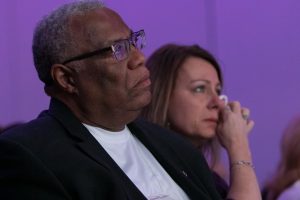
Double Your Impact for the Holidays
Double Your Impact for the Holidays
Your urgently needed year-end gift can go twice as far to provide care and support and accelerate Alzheimer's research this holiday season — and all year long. Show your giving spirit today during this 2x Match Challenge.
Donate Now
Today, my mother is living with Alzheimer’s disease – just like my aunt and grandmother. And at the age of 66, I am living with mild cognitive impairment (MCI).
Looking back, I realize that I had had symptoms for many years. There was the time I bought multiple cartons of milk in one shopping trip. Often, I’d leave my phone on top of my car and drive away. I started forgetting social dates and critical appointments.
I spent 20 years as an international flight attendant, with a revolving door of co-workers, so the seriousness of these events was often dismissed by people as carelessness, or worse, went unnoticed. I lived alone, and I didn’t have family and friends around often enough to notice any changes in my daily life. And because of my lifestyle, it was so difficult for me to come to grips with the possibility of losing my independence.
Life changed once I reached out to the Alzheimer’s Association for information and support; I never could have imagined how life-changing that one phone call would be! In the Association, I found all I was looking for and more, including the inspiration to share my voice.
Today, I focus on maintaining my independence as much as possible, and I’ve found creative and safe ways to continue enjoying some of my favorite activities. While I am retired from a long career of serving others, I now serve an even greater purpose in life: I have “re-imagined” myself as an Alzheimer’s advocate, serving as a member of the Association’s National Early-Stage Advisory Group for the past year.
When speaking openly about my diagnosis, the first response I typically receive is: “I’m so sorry!” Understandably, people don’t know what to say. But my advice is this: “Don’t say anything – just listen.” Listen to my thoughts, concerns and funny stories. Listen to my hopes and fears. Listen to how this diagnosis has affected me — for worse and for better. Keep listening, and keep sharing stories. They truly are the most powerful weapon we have in the fight against this disease.
Even though I have MCI, I’m still living. I’m just living a new chapter of my life – and my story is not over yet.
About the Author: Brian Van Buren is raising awareness of Alzheimer’s disease as a member of the Alzheimer’s Association National Early-Stage Advisory Group (ESAG).
Learn More:
